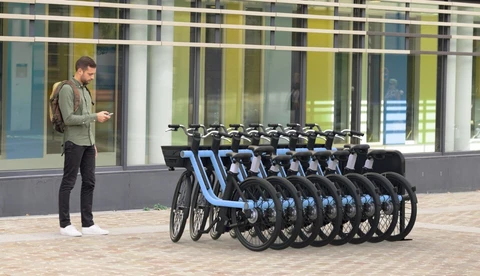
Did you know, Oxford Street was scientifically proven to have the highest concentration of the toxic gas nitrogen dioxide, in the world, according to several studies? This is largely due to the number of buses and taxis travelling up and down, dropping off more than 220,000 people daily. Issues from the toxic fumes (to name but a few), include; a rising number of asthma cases. In fact, poor air quality is estimated to contribute to 9,000 premature deaths across the UK annually, which is nearly twice what was initially forecasted. It is research like this that motivates the team at Zwings to go above and beyond to help businesses do their part in promoting alternative modes of sustainable transport. Zwings designs personalised urban mobility solutions for businesses in the form of private fleets of e-bikes and e-scooters. Created for corporates that want to solve their employees commuting challenges, or for the real estate industry seeking to boost occupancies with a new amenity. Not only do these vehicles directly tackle the emissions and congestion crises, they also provide stress-relieving convenience, can save 60% of an individual’s total annual spend on public transport, and, they deliver at least 3X more fun than clambering onto a bus or train and standing next to someone’s armpit.
What is exciting is that thanks to the electrically-propelled nature of these new modes of personal transport the masses of populations who would not usually choose to ride an ordinary bicycle before but now are more inclined to as the electric boost means they do not have to arrive to their destination sweaty. Combined with the rapidly growing availability of cycle lane infrastructure across Europe, the data indicates an evolutionary shift away from cars and public transport into these morale boosting modes of travel. In fact, in terms of uptake, there were more downloads of electric scooter sharing apps in 2018 than Instagram in certain cities in Europe and the USA.

Corporate Micro-mobility – “Why Should We Care?”
Micro-mobility is defined as the use of light (sub 500kg), short-distance (0 to 10km), active or electric-powered personal transportation. These vehicles grant freedom from fossil fuels and liberation from rush-hour tailbacks. Commercial and residential properties are increasingly under scrutiny to mitigate their direct and indirect contributions to emissions. This includes taking greater accountability of how their employees travel to and from work, or customers choose to explore the local area. The provision of sustainable transport is an increasingly popular perk or amenity as part of a corporate’s social responsibility. With the availability of the business mobility solution from Zwings, it’s never been easier to seamlessly integrate a fleet of electric scooters or electric bikes to a business’ property. We provide all that our clients need (including state of the art rental software, maintenance and docking stations). This way, you can continue focussing on your core business.

It is Zwings’ Head of UK & Ireland job to sit down with clients to determine how much emissions they are producing, and in what ways they can offset this pollution produced by stakeholders with sustainable modes of travel; such as e-scooters and e-bikes. Jamie completed his Master’s degree in Environmental Technology at Imperial College and bought to the company his invaluable insight into all things sustainability. Did you know that the average commuter by car emits 7.5 kg of CO2 daily, and carries just the driver as the only passenger for 9 out of every 10 trips? You may respond with: “oh, but my car is electric, so spare me”. An e-scooter is still 20X more energy efficient than Tesla’s most environmentally friendly car, the Model 3. My point being, even the ‘greenest’ electric car really isn’t all that great for the environment, topped further by the fact that electric cars still add to traffic as much as any other car – leading to more fumes from gas guzzling vehicles.
Jamie expands further: “if you leave the car behind a couple of times a week, it could collectively make a huge difference to the traffic congestion in busy towns and cities. By providing a travel solution to your employees or customers, not only can they enjoy quick travel to meetings whilst saving money, they can also benefit from the boost to their morale”. Typically, e-bikes and e-scooters solve the first or last-mile challenges to get to public transport stations, but more recently, thanks to improved battery range and higher levels of comfort commuters within 5 miles of work are now more willing to use these vehicles to travel from their front door to their office and in just 60 – 70% of the time it would take on public transport.
Companies can also compete with others via the fitness social networkStrava, which allows users to compare bike usage data to compete amongst office members and friends. Promoting an active lifestyle in your workforce tends to encourage an individual’s creativity, learning, memory, and concentration, according toa 2014 Harvard study.
Collectively, we need to challenge the norm of the driven commute and take greater account of alternative modes of travel than buses, trains and taxis. 2020 has kickstarted a decade that will see an evolutionary shift towards low to zero emissions, traffic reducing, fun, personal transportation. To realise this on a corporate level would be a valuable step towards reducing our carbon footprint and inner-city emissions.

